A very happy 96th birthday to Mr. Charlie Parker! Let’s celebrate with his arrangement of Gershwin’s “I’ve Got Rhythm!”
Well, I enjoyed having the 2016 Summer Olympics in Rio de Janeiro on in the background for the past two weeks and in the process thought that this would make a great theme for this week. This led to picking two insperational and very different sports films. (And making it clear to myself that Munich didn’t count)
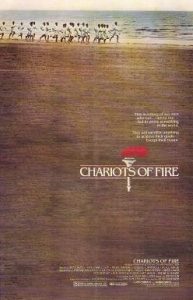 Chariots of Fire is yet another one of those modern classics that I hadn’t gotten around to seeing until now. Pretty much all I knew about it was what everyone knows (and frequently makes fun of) the theme music and Brittish Athletes running on the beach. Turns out that’s all in the first five minutes and doesn’t have anything to do with the rest of the film.
Chariots of Fire is yet another one of those modern classics that I hadn’t gotten around to seeing until now. Pretty much all I knew about it was what everyone knows (and frequently makes fun of) the theme music and Brittish Athletes running on the beach. Turns out that’s all in the first five minutes and doesn’t have anything to do with the rest of the film.
Anyway Chariots of Fire tells the story of runners Harold Abrahams and Eric Liddel and their quest for Olympic Gold. Both have their reasons, For Abrahams running is a way for him to fight against, and rise above, the prevelent anti semitism of the time. For Liddel running is an expression of his Christian faith.
This was a beautifully done film with my biggest problem was the way. Liddel and Abraham’s story run paralel to each other but other than Abrahams being driven to beat Liddel after loosing to him they hardly every interact (in fact I think I can count on my hand the number of times they even meet) and other than Liddel refusing to run his best race on a Sunday, there didn’t seem to be any real conflict. Our heroes winning the final races felt inevitable.
Still the Music was great.
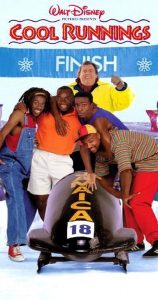 What I’d known about Cool Runnings, when it first came out, was it was very loosely based on the real Jamaican Bobsled Team and was a John Candy vehicle with a lot of Rasta humor.
What I’d known about Cool Runnings, when it first came out, was it was very loosely based on the real Jamaican Bobsled Team and was a John Candy vehicle with a lot of Rasta humor.
But despite what any of the trailers tell us this is a relatively serious sports story. It tells the story of Deince Bannock, played by Leon, a promising sprinter who fails to qualify for the 1988 Summer Olympics when another runner tripping knocks him and another Runner over. Because the summer olympics track and field events are now lost to him he gets the idea that his running ability can be used in the Winter Olympics in Calgary to push a bobsled.
Here he recruits (coerces) Irv Blitzer a disgraced American Bobsledder, played by John Candy as their coach, and brings together the other runners who wiped out with him to form a a team.
From here we have an underdog/fish out of water story as our intrepid team tries to come together as an Olympic team in the extremely cold, and extremely white Calgary. But it’s quite uplifting to watch our team develop from a joke to a legitimate wildcard as our film goes on.
https://www.youtube.com/watch?v=PWle59ZHPIM
For this seek’s Rhapsody we have Rhapsody, courtesy of Frankie Valli and The Four Seasons.
I was trying to find modern versions of Greek Mythology and somewhere in the middle of that rather general search I settled on the myth of Orpheus. The story of the master musician who looses the his true love only to loose her again while using his powers to go down to the underworld to regain her has been great material for artists for millenia and I watched two of them.
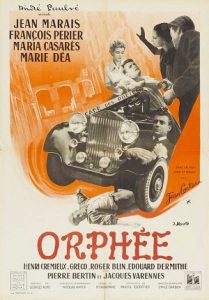 For my first film we had Orpheus by the great Jean Cocteau, part of his Orphic Trilogy between Blood of a Poet and Testament of Orpheus. In this version Orpheus, played by Jean Marais, is an arrogant poet slightly past his prime as his popularity has been supplanted by younger artists who hate and criticize his work.
For my first film we had Orpheus by the great Jean Cocteau, part of his Orphic Trilogy between Blood of a Poet and Testament of Orpheus. In this version Orpheus, played by Jean Marais, is an arrogant poet slightly past his prime as his popularity has been supplanted by younger artists who hate and criticize his work.
During a scuffle at a poet’s club he is taken to the mansion of “a Princess”, played by María Casares, who is soon revealed to be “his death”. This causes him to be missing over the night drawing the attention of his wife Eurydice, the police, and a feminist literary magazine, le Bachanalle, who have past relationships with Eurydice and are very antagonistic against Orpheus.
Orpheus is brought home by the Princess’s chauffeur Heurtebise, played by François Périer, who stays on and befriends Eurydice. In the meantime Orpheus becomes obsessed with strange random messages coming from the car radio of the princes’s Limo. Eventually his inattention leads to Eurydice’s death in an accident and she is taken to the underworld by the Princess.
With Heurtebise’s help Orpheus follows them to the underworld where Eurydice’s is being investigated by a tribunal. Eurydice is given probation to return under the usual conditions of Orpheus being forbidden to look upon her (though unlike in the original story this condition is forever) the leads to a series of almost comical attempts of the two down everything to avoid being in each other’s line of sight. Regrettably he finally sees her in a car mirror and she disappears.
This is a wonderfully surreal film worthy of Cocteau’s usual standards. While not quite as fantastic as La Belle et La Bette it has a wonderful low key dreamlike quality that allows people to walk through mirror and float down corridors with deceptively simple special effects.
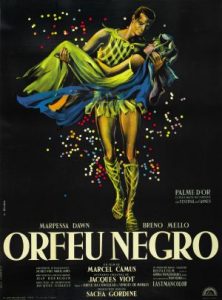 My next film on my list, Black Orpheus, directed by Marel Camus, is another one of those films that is in just about every film reference book I know and for whatever reason I’ve never seen.
My next film on my list, Black Orpheus, directed by Marel Camus, is another one of those films that is in just about every film reference book I know and for whatever reason I’ve never seen.
In this take the story of Orpheus and Eurydice is taken to modern times in the slums of Rio de Janeiro during Carnival. Orpheus, played byBreno Mello is a popular dancer and guitarist about to be married to the fun but extremely high maintenance Mara (in a comical aside the clerk at the licenser’s office notices Orpheus’s name and comments on the story, which leads the jealous and easily enraged Mara to ask “who is this Eurydice person?”)
Eurydice, played by Marpessa Dawn, it turns out is a sweet girl from the country visiting her cousin while being pursued by a mysterious stranger who she believes is trying to kill her. When Orpheus meets Eurydice it is love at first sight, despite his engagement.
Together the two attend carnival with Eurydice disguised as her cousin so Mara won’t find out. Meanwhile the stranger, now revealed as Death, still pursues them in his full regalia using the crowd as camouflage. Regrettably in the end he succeeds and Orpheus tries to follow to the land of the dead in the form of a Macumba ritual, but regrettably the two lovers reunion can be only measured in seconds as Orpheus turns to see where her voice is coming from.
This was a gorgeous film with wonderful music. And a visual treat with the constant dance in this romanticized version of the Brazilian lower classes nearly all played by amateur actors.
I found myself fascinated with how these two interpretations were nearly direct opposites with cocteau’s film being quiet, mildly nihilistic shot in crisp black in white and Camus’s film is vibrant and colorful with the actors virtually glowing with warm earth tones as they loudly celebrate life. (of which death is an integral part)
https://www.youtube.com/watch?v=NkxGkL7o9xk
As an excuse to watch Screwball comedies again I decided to focus on the team up between two individuals not usually associated with comedy, Cary Grant and Katherine Hepburn.
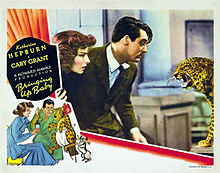 I’m embarrassed to admit one of the reasons I’d never gotten around to seeing the comedy classic Bringing up Baby, was when I first heard about it I mixed it up with Bedtime For Bonzo. Now that I’ve seen it, and know better, I regret not having the opportunity to have it memorized after years of watching it obsessively.
I’m embarrassed to admit one of the reasons I’d never gotten around to seeing the comedy classic Bringing up Baby, was when I first heard about it I mixed it up with Bedtime For Bonzo. Now that I’ve seen it, and know better, I regret not having the opportunity to have it memorized after years of watching it obsessively.
Cary Grant plays David Huxley an inept doormat of a paleontologist. From his point of view everything is going right for him. He’s one bone away from putting together a complete brontosaurus skeleton and he’s engaged to a loveless marriage with his assistant. (This isn’t hyperbole. His fiancé flat out says there will be no love involved). Now all he has to do is ensure the museum gets funding from a wealthy donor.
And then SHE shows up.
Catherine Hepburn plays Susan Vance the craziest Manic Pixie Dream Girl to grace the silver screen. From here she drags Huxley from one crazy situation to the next, completely destroying everything important to him in the process.
Also there’s a leapard.
This film is fantastic, both Grant and Hepburn are utterly hilarious playing against type (it was all the funnier when I first watched it on a Youtube video playing it slightly slow making Grant sound even goofier.) and every turn of events and sight gag makes it even funnier.
Bringing Up Baby nearly destroyed Hepburn’s career (Yeah. Go figure.) But she came back in force two years later in our next film The Philadelphia Story.
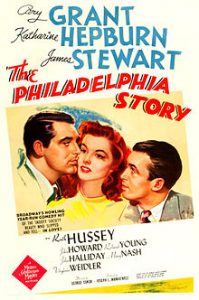 The Philadelphia Story tells the story of a Tracy Samantha Lord (Hepburn) a rich socialite engaged to a nouveau rich mining executive. However in the sidelines are a reporter (Jimmy Stewart) from a gossip rag and well as her ex-husband. ) Grant) Hilarity ensues.
The Philadelphia Story tells the story of a Tracy Samantha Lord (Hepburn) a rich socialite engaged to a nouveau rich mining executive. However in the sidelines are a reporter (Jimmy Stewart) from a gossip rag and well as her ex-husband. ) Grant) Hilarity ensues.
I have to say this is one of those films I really wanted to like more. I had seen the musical adaptation of it with Bing Crosby, Frank Sinatra and Louis Armstrong when I was in high school and I found myself following along what I already knew of the plat with predictable results.
Hepburn mostly serves as the sarcastic straight woman who, while witty isn’t half as funny as she is in Bringing Up Baby. Still I always enjoy it whenever Stewart plays something besides his boilerplate golly gee all american character… Frankly I think Virginia Weidler as Tracy’s kid sister steels the show.
https://www.youtube.com/watch?v=o-EkAb1h2OM
This week we take a quick, very quick, look at the band Blink-182 with “Brohemian Rhapsody”.
This has to be the shortest Rhapsody I’ve done yet in the series. I would argue that this stretches the definition as 30 seconds hardly gives the creator a chance to improvise.
But at least it’s not yet another Queen variation. I dreaded it would be when I saw the name.






